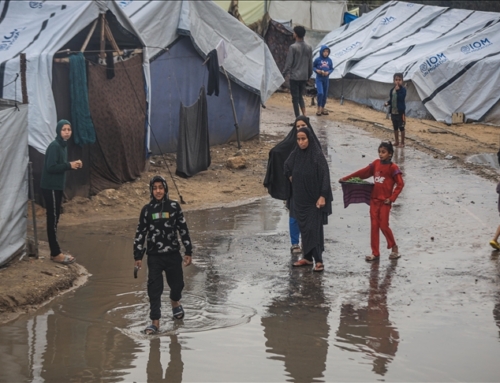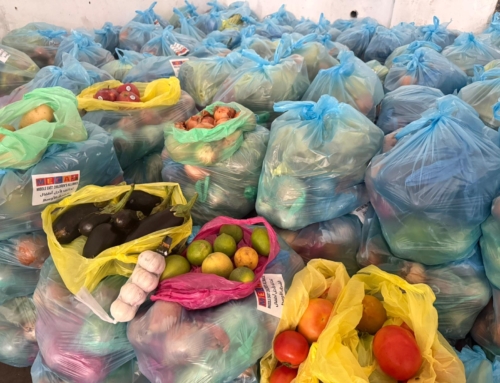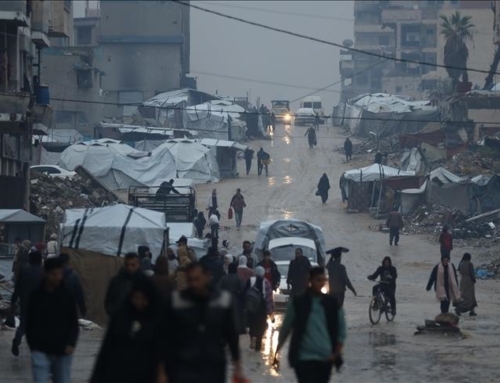When mama knew that she was pregnant with a girl, Baba wanted to name me Saba’a. For 9 months I was Saba’a, the first grandchild of my mom’s family, and the second-to-be-born in Gaza on my father’s. All were waiting for the new coming baby.
When I finally arrived, Baba suddenly changed his mind. He says that the moment he saw my face, my name slipped out of him without thought: Eman.
In our Arabic culture, there’s a proverb that says everyone lives up to the meaning of their name. Some even believe that our names shape our destinies.
Eman in Arabic means faith. It also carries the sense of trust. And so, from my earliest steps, I carried both faith and trust with me. Whenever I felt lost, I reminded myself to live up to my name: to be a true Eman, a true believer.
Those who met me used to be astonished with my dedication and how I believe in things. My eman became the theme of my life, the fuel that kept me sane.

Eman with her father when she was almost one year old in 2002
Eman as a daughter
I grew up in the gentle embrace of a normal family life, wrapped in love and trust. As the first child, Mama and Baba poured all their care into me: poetry, Qur’an, lullabies, lessons in courage and choice. They clapped for my victories, wiped my tears in defeat, and celebrated every milestone, from my first prayer to the day I graduated.
For that, I promised myself I would never fail them.
I still remember Mama waking me before school, her hands gently braiding my hair while the smell of fresh bread filled the house. Baba would wait by the door, teasing me for being late, then slipping two shekels into my hand for sweets. Those small rituals made me feel safe, cherished, and alive.
They were always behind me in all my ups and downs. But now, in a life torn apart by genocide, guilt eats at me. My parents, once so full of energy, are now consumed with survival, worried about water, food, firewood, and daily struggles we had never imagined before the genocide.
Mama, who once braided my hair every morning, no longer has the time or energy to do the same for Roaa. Baba, who once surprised me with a phone as a gift, cannot afford one for Mohammed. Safa, Abood, Amr, and Ali—all of them are growing up without the small joys I once knew, and my heart aches knowing they will never taste the life I had.
I carry a deep responsibility toward my siblings, pushing myself to make up for the life I was given and they were denied.
Israel has stolen our future, and I have been forced to adapt to a new reality: one where I witness my parents fading slowly under the weight of suffering.
Some nights I return home late and completely worn out, yet I still push myself to complete household chores. Other times, I insist on rising early to wash dishes and prepare breakfast before rushing out again.
Living in a tent without a washing machine, fridge, or stove feels like a curse, both physically and mentally. Every detail of survival feels like an attack on our humanity.
Yet even within this heaviness, I believe daughters should care for their parents with all their hearts, but how can I give them the love they deserve when I am too heartbroken, too drained, and trapped in the middle of genocide?
Eman as a friend
I lost thirty-five friends to the genocide. None of them did I get to bid farewell. Thirteen of my friends lost children, husbands, or other loved ones. None of them did I manage to console properly.
Each friend I lost was a tragedy of its own. My phone’s gallery used to be a window to laughter and shared moments; however, it has turned into a graveyard of memories now. I avoid opening it afraid of the ghosts waiting for me inside. Sometimes my mind unconsciously buries these memories, shielding me from pain. Yet when I catch myself in the act, I grow furious and deliberately insist on clutching at every recollection.
To lose them twice would be an unforgivable betrayal. I would never pardon myself no matter how much the pain.
In war, friends do not grow old. They do not gather for weddings, or celebrate each other’s small victories. They do not crowd into cafes to gossip, or waste afternoons swapping silly reels and discussing the deepest universal issues. Instead, what remains are names, faces, and voices that haunt us every night.
This death haunts me. I push myself to see my friends, to never let any of them down, even to avoid arguments or upsetting them. I try to be there no matter how much I’m exhausted or out of choices. Because I know I might regret being absent later.
Every day I fail again. Sometimes I surrender to grief, desperate to hear them once more. Each day is a struggle between continuing the paths my lost friends would have wanted, honoring their dreams, checking on their families, and trying to stay connected with those still alive.
I can’t refuse invitations to see friends, even when I’m exhausted, because it might be the last time. I carve out the hours between work and family, just to be there. They are my refuge, my shoulder to lean on, the reason I keep surviving. They bring color when all I see is darkness. They take my hand when I’m lost and guide me through paths I’m too afraid to step on alone.
My friends are everything to me. I’ve lost so many, and I fear losing more. My heart keeps asking: am I truly being Eman for them–carrying the love, the faith, the trust I hold inside?
I hope so. I have to hope so, because without that, what else keeps me going on in this world of shadows?
 Eman as a hard worker
Eman as a hard worker
Since my early years at university, I have always taken my work seriously. Despite all my responsibilities as a student, I built a bright career path as a content writer, translator, and later a content trainer. I always emaned the power of words. Before the genocide, I worked three part-time jobs as a promotional and social media content writer.
But just a month after graduation, the genocide began, and one by one, I lost them all.
For months I was paralyzed, waiting for an end that never came, until I forced myself to rise differently.
In November 2024, I joined MECA as a communication manager. I still remember my answer to the question of why they should choose me: I told them: “I love Gaza, and my love for it is what brought me here, to sit in front of you today, determined to work for Gaza and the people of Palestine.”
This work pulled me closer to pain. I lost colleagues, friends, even beneficiaries who became martyrs. I spent endless hours writing reports and testimonies in inhuman conditions, often drained, often broken. The famine blurred my focus and shook my health, yet I clung to the stubborn eman that my survival mattered.
Because people here depend on me to carry their stories, and Palestine needs witnesses, I kept on fighting to stay connected; scrambling for electricity, chasing fragments of internet, and forcing myself to keep writing through the weight of news and despair.
I truly miss working from my own room, the ease of an office.
No matter how heavy this becomes, I will not stop. Work, for me, is freedom and power, a refusal to surrender. I believe in words, in their ability to free us long before the borders ever open. And so, even if I collapse, even if I break, my pen will not dry.
Eman as a human
Before I am a daughter, a sister, a friend, or a worker, I am simply a human.
A human who loves tea with mint and coffee with cardamom, who hates soda, prefers grilled chicken to fried, and mango ice cream to strawberry. A human who once carefully chose the colors of her clothes.
I love literature. I love love itself. I love complete stories, though I haven’t been able to finish one in a long time.
I love the land and its trees. I love sunflowers, and how they keep turning toward the light. I love yellow, because it reminds me of dawn. I love poetry, and Marcel Khalife’s voice when it used to break the silence of the taxis every morning. I love watching birds soaring freely into the sky, horses racing as if nothing stops them, and friends laughing until the world feels bearable again. I miss the small, ordinary things: writing with a cup of coffee beside me instead of swallowing only the bitterness of reality.
I hate politics, parties, and death. I hate walls and prisons and the way people get reduced to sides and slogans. And yet I still give my eman to humanity. Fiercely, humanity is the most wonderful and honest battle. It connects us all despite our differences.
Closing
I follow the struggles and matters of people outside Gaza too, because our pain is part of theirs, and every fall of a tyrant anywhere is a step closer to freedom everywhere.
My wish today is simple. I pray for strength to hold on to my values, to keep my eman even in moments of doubt and collapse, even when both joy and sorrow live deeply inside me.
I pray that my family is safe, that my friends are safe, that Gaza is safe. I pray to keep becoming a better version of myself, and for this world to become fair.
I want to see a Palestine beyond Gaza’s siege. I want to meet all my colleagues and friends behind these borders.
Until then, I will keep writing. Words heal even as they wound; they liberate even as they ignite. They change the world. They spark revolutions. They lift us when silence would bury us.
Perhaps that is why Baba named me Eman; to carry faith, to give trust, and to keep emaning the power and value of words, even when everything else falls apart.
Today I turn twenty-four. It feels strange to say it here, after all the memories, the grief, the absence. Birthdays in war are no longer about cakes or candles. They are moments of pause, a chance to see how far we’ve come and how much has been lost.
For seven years, I wrote myself secret letters on every birthday, tucking them away to read a year later. I would sit alone, laugh at my younger self, marvel at what had come true, and plan to chase what hadn’t.
This year, for the first time, I dare to write on my birthday, and share it in public. Because even my birthday now belongs to Gaza, not just to me. And I still don’t know if I’ll be here to read it next year or…
Written by Eman Alastal, who struggles to keep her eman in humanity alive





